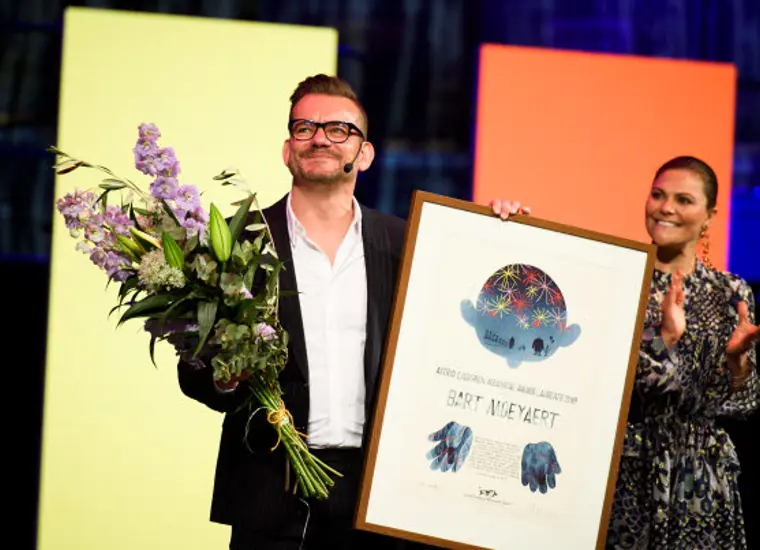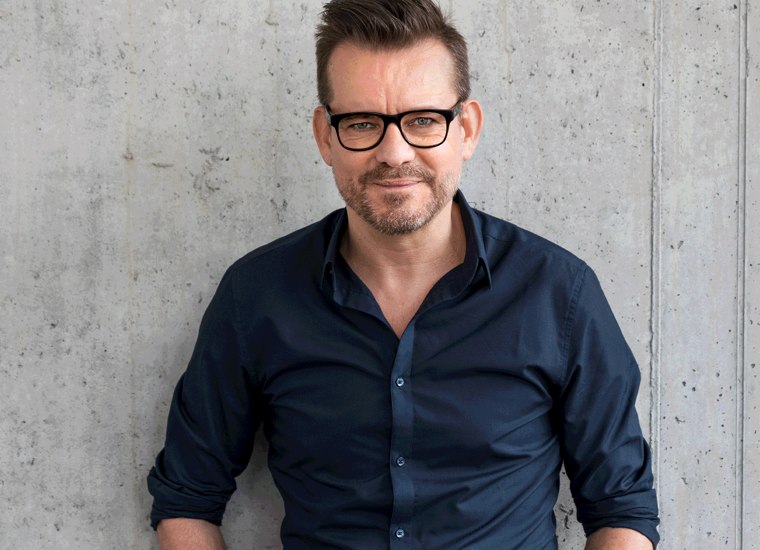A language that vibrates with emotions
Born in Belgium in 1964, Bart Moeyaert is a multi-award winning author who has written for children and young people since his debut at age 19. His large and diverse body of work encompasses over fifty titles, ranging from picture books and YA works to poetry, plays, song lyrics, television screenplays and essays.
 Photo: Susanne Kronholm
Photo: Susanne KronholmQuick facts
The jury’s motivation
Bart Moeyaert’s condensed and musical language vibrates with suppressed emotions and unspoken desires. He portrays relationships at crisis point with a cinematic immediacy, even as his complex narratives suggest new ways forward. Bart Moeyaert’s luminous work underscores the fact that books for children and young people have a self-evident place in world literature.
Bart Moeyaert made his debut as a writer in 1983. He grew up as the youngest of seven brothers in the Belgian city of Bruges. In interviews, he often tells about how as a child he used to sit under the dinner table and listen to everyone else's stories, which gave him lots of material for his future life as a writer. While growing up, he felt that it was safer to write than to speak, because he liked to think and take time before he started talking.
When I was nine I read Astrid Lindgren’s books and the world of Astrid Lindgren was like my own family and the real world was like hers. And later I saw that her world was about inclusion. And that was comforting because I was a loner in my big family since I was the youngest. And this influenced my work. /Bart Moeyaert.
Bart Moeyaert has a literary language that is compressed and musical, and a suggestively charged narrative technique that conveys a filmlike sense of immediacy. He works in shades of grey. He draws no easy lines between good and evil, heroes and villains. Instead, he puts complex relationships under the loupe. Nor does Moeyaert serve up clear-cut happy endings. Instead, the onward path reveals itself in a comprehension of the circumstances and in the characters themselves.
The phone call from the jury
A literary language that is compressed and musical
This text was written in 2019 by members of the award jury.
Born in Belgium in 1964, Bart Moeyaert is a multi-award winning author who has written for children and young people since his debut at age 19 with Duet met valse noten (1983). His large and diverse body of work encompasses over fifty titles, ranging from picture books and YA works to poetry, plays, song lyrics, television screenplays and essays.
Bart Moeyaert has a literary language that is compressed and musical, and a suggestively charged narrative technique that conveys a filmlike sense of immediacy. Most of his books take place during a strictly limited time frame: one day or even one moment in which everyday situations shift and change and conflicts come to a head. His stories are set in unspecified times and places. Moeyaert focuses on the here-and-now, scrutinizing the conditions under which his characters live and their relationships with one another.
Bart Moeyaert works in shades of grey. He draws no easy lines between good and evil, heroes and villains. Instead, he puts complex relationships under the loupe. We find motives for his characters’ actions in the periphery of the stories: perhaps an absence, or a brokenness, or some lack we sense but never see. Nor does Moeyaert serve up clear-cut happy endings. Instead, the onward path reveals itself in a comprehension of the circumstances and in the characters themselves.
Blote handen (1995, Bare Hands) opens on New Year’s Eve. A boy named Ward races through his village with a friend, trying to get away from Ward’s neighbor, Betjeman. We take a nose-dive into the action and Ward’s tumultuous emotions. Gradually we get pieces of the back story. Ward has trespassed on Betjeman’s property and killed one of his ducks, maybe on purpose, maybe not. Ward sees Betjeman, who has a prosthetic hand, as a grotesque monster. In a fit of rage, Betjeman kills Ward’s dog. A life for a life. But now both of them have gone too far. We see the terrible things people can do with their “bare hands”—things that can never be undone. Moeyaert does not tell us who to blame. It is a pulse-racing, disturbing drama. But despite the horror of the situation, we sense an opening as the story ends. Midnight approaches; something new stands on the threshold. Ward’s friend’s mother says hopefully: “They sure knew what they did when they invented the year.”
The masterpiece Het is de liefde die we niet begrijpen (1999, It’s Love We Don’t Understand) portrays a family coming apart at the seams. Here Moeyaert excels in his ability to engineer crucibles of conflict on the verge of blowing up. In three sequences, we follow a dysfunctional family whose children are left to fulfill their own needs for love, confirmation and a structure to their daily life. The opening sequence casts us straight into a scene already at emotional bursting point. It is summer and the family is packed into a sweltering car. The teenage daughter looks on as her mother and older brother argue: brakes screech, car doors slam, shouts echo. She tries to shield her little sister by taking her away from the car as the fight exposes uncomfortable truths. In the final sequence, her brother has moved out but remains almost physically present in her imagination. The strong loving bonds among the abandoned siblings are captured in an unforgettable, dreamlike closing scene.
The autobiographical Broere (2002, Brothers) is a warm and humorous story about growing up as the youngest of seven brothers. Throughout its short chapters, Bart is strongly and safely wrapped in the solidarity of brotherhood. As the baby of the family, Bart looks up to his older brothers for their knowledge and abilities, but inevitably also sometimes gets left out. Each brother has his own defining trait, and at age six Bart has already realized that his skill is being able to discover things just by looking around. The book has also been adapted for the stage.
The enigmatic, the unspoken and the repressed feature prominently in many of Moeyaert’s books, among them Dani Bennoni (2005, Dani Bennoni – long may he live). A boy named Bing puts on his older brother’s much-too-big football uniform and orders his brother’s friend Dani to teach him to play football. When Dani refuses, Bing tries a new tactic to get his way. The story is compressed, even claustrophobic, and saturated with repressed emotion. Bing’s brother has been called up to a war we glimpse only in the background, paralyzing Bing’s mother with grief and affecting Bing’s choices as well. Bing’s relationship to Dani is complicated by manipulation, blackmail and secret sexual acts. There are no easy, rational or unequivocal choices between good and evil, right and wrong.
Much of De melkweg (2011) takes place atop a wall. The protagonist Oscar, his brother Bossie, and a girl named Geesje sit on the wall in the summer heat, surveying the neighborhood. Not much is going on. Inside the wall, Priit and Petra do work with scrap iron. They come from another country and talk in a language that the first-person narrator calls “scrapironese.” Outside the wall, an old lady walks past each day with an old dog. The children place bets on whether the lady or the dog will die first. One day a new girl shows up from a neighborhood further away, upsetting the old order. The characters do what they do next for reasons that are hard to discern, even for them. In the end, however, words come—spoken and written—that help bring the characters closer together.
Moeyaert’s books for younger readers feature a strong sense of solidarity with the characters and an often subtle sense of humor. These short stories have been published both as standalone books and in various collections, and they too are emotionally charged and rich in subtexts. In Echt weg is niet zo ver (1993), ten-year-old Roos’s father has left to get help to stop drinking, yelling and hitting. The family is relieved, but Roos misses her father. She tries to understand her conflicting feelings, and turns to a big sister for comfort and protection when it gets to be too much.
Bart Moeyaert is largely a realist writer, but he has also drawn inspiration from and set his stamp on fables, familiar fairy-tale tropes and Biblical stories. In a trilogy of picture books, De Schepping (2003), Het Paradijs (2010) and De Hemel (2015), he reimagines Christian creation stories in his own inimitable fashion. The first two books in the trilogy are illustrated by Wolf Erlbruch, the third by Gerda Dendooven. These playful and penetrating children’s books, which revolve around existential questions, are expressions of the writer’s art that challenge narrow categories of age and genre. Moeyaert has an intense interest in music, something that has shaped his writing in many ways. Several of his books were inspired by a particular musical genre or a song: swing in Dani Bennoni, for instance, or the Nancy Sinatra song “These Boots Are Made for Walkin’” in De Melkweg. Some have accompanying CDs, including the award-winning storybook Luna van de boom (2000), illustrated by Gerda Dendooven and with music by Filip Bral.
Bart Moeyaert’s rich oeuvre fascinates us for its will to challenge, its dedication to minimalism and its refusal to compromise. Moeyaert favors images and intimations over explanations and morals. His sparing descriptions make his stories speak louder. His cinematic style and the formal perfection of his language require slow, thoughtful reading. Moeyaert trusts that readers will take their time and penetrate what he is saying, not only in the words he puts on the page, but also in between the lines. His characters are not always as they first seem. We find them in unstable relationships and emotional confusion. This year’s laureate has no interest in painting idyllic scenes or pure and innocent childhoods. He wants his books to show us life in all its many facets.
Moeyaert also translates children’s and YA literature into Dutch. His books continue to be released in new editions and have been translated in more than 20 countries. He has also held many prestigious appointments, including Poet Laureate of the City of Antwerp in 2006–2007.
Literature broadens your mind and opens frontiers. Literature gives you a language to express yourself and say what you mean. Literature can make you feel angry, and that’s important, because it forces you to think.

"To be seen and listened to is a recurring theme in what I write"
How did Bart Moeyaert become a storyteller? What does he want to say with his stories and how did he feel when he heard the ALMA jury’s decision?
Read our interview with Bart Moeyaert
Acceptance Speech
"I would like to thank the jury of the Astrid Lindgren Memorial Award. You have read me in the way that every writer would like to be read. Never before have I felt so understood."
The full Acceptance SpeechBart Moeyaertin conversation with journalist Christine Knödler. Filmed at the Frankfurt Bookfair on 21 October, 2022.

Discover our laureates
The Astrid Lindgren Memorial Award is awarded to authors, illustrators and narrators, but also to people or organizations that work to promote reading.
Find out more about the laureates
Children have the right to great stories
To lose yourself in a story is to find yourself in the grip of an irresistible power. A power that provokes thought, unlocks language and allows the imagination to roam free. The Astrid Lindgren Memorial Award was created in 2002 by the Swedish government to promote every child’s right to great stories.
Find out more about the award